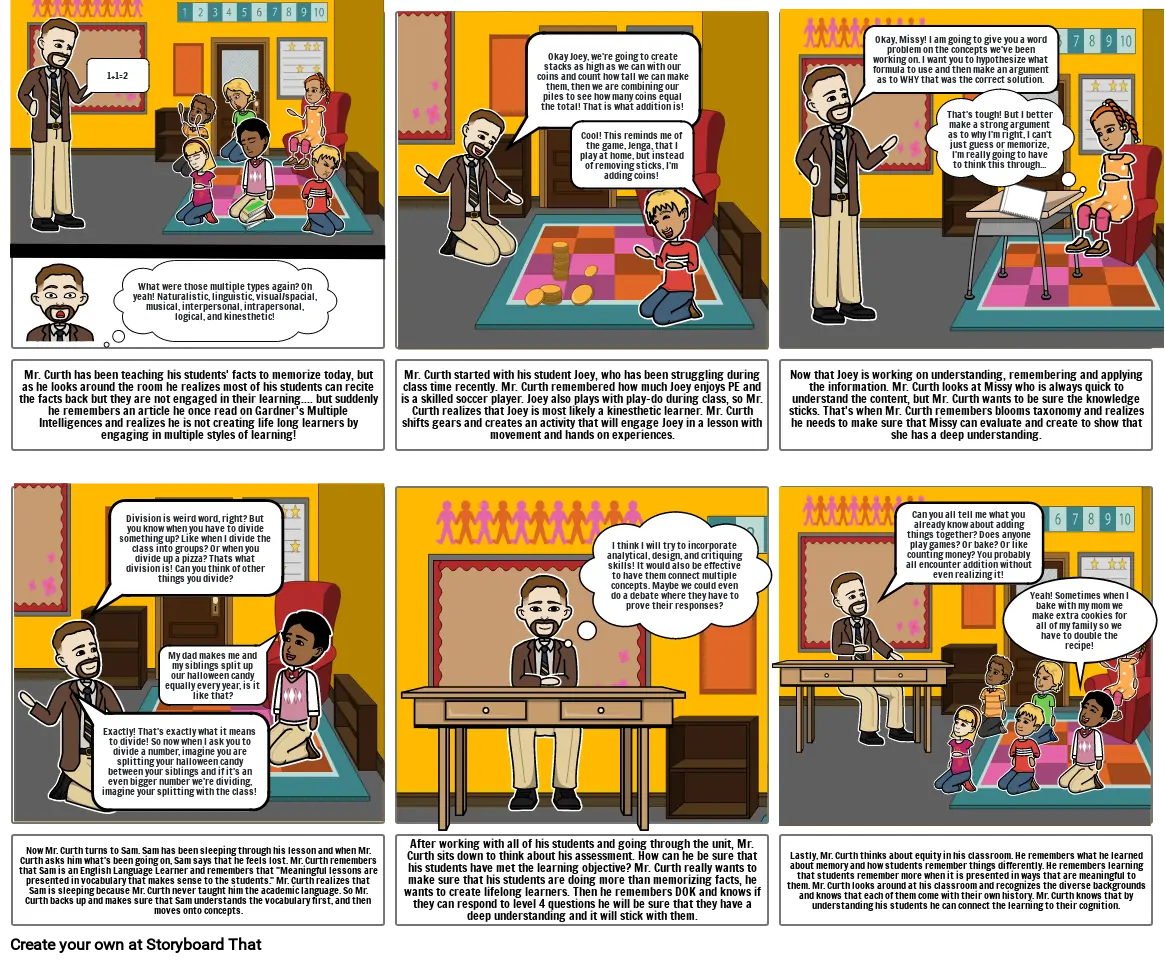Application Activity #1

Текст Раскадровки
- 1+1=2
- What were those multiple types again? Oh yeah! Naturalistic, linguistic, visual/spacial, musical, interpersonal, intrapersonal, logical, and kinesthetic!
- Okay Joey, we're going to create stacks as high as we can with our coins and count how tall we can make them, then we are combining our piles to see how many coins equal the total! That is what addition is!
- Cool! This reminds me of the game, Jenga, that I play at home, but instead of removing sticks, I'm adding coins!
- Okay, Missy! I am going to give you a word problem on the concepts we've been working on. I want you to hypothesize what formula to use and then make an argument as to WHY that was the correct solution.
- That's tough! But I better make a strong argument as to why I'm right, I can't just guess or memorize, I'm really going to have to think this through...
- Mr. Curth has been teaching his students' facts to memorize today, but as he looks around the room he realizes most of his students can recite the facts back but they are not engaged in their learning.... but suddenly he remembers an article he once read on Gardner's Multiple Intelligences and realizes he is not creating life long learners by engaging in multiple styles of learning!
- Exactly! That's exactly what it means to divide! So now when I ask you to divide a number, imagine you are splitting your halloween candy between your siblings and if it's an even bigger number we're dividing, imagine your splitting with the class!
- Division is weird word, right? But you know when you have to divide something up? Like when I divide the class into groups? Or when you divide up a pizza? Thats what division is! Can you think of other things you divide?
- My dad makes me and my siblings split up our halloween candy equally every year, is it like that?
- Mr. Curth started with his student Joey, who has been struggling during class time recently. Mr. Curth remembered how much Joey enjoys PE and is a skilled soccer player. Joey also plays with play-do during class, so Mr. Curth realizes that Joey is most likely a kinesthetic learner. Mr. Curth shifts gears and creates an activity that will engage Joey in a lesson with movement and hands on experiences.
- I think I will try to incorporate analytical, design, and critiquing skills! It would also be effective to have them connect multiple concepts. Maybe we could even do a debate where they have to prove their responses?
- Now that Joey is working on understanding, remembering and applying the information. Mr. Curth looks at Missy who is always quick to understand the content, but Mr. Curth wants to be sure the knowledge sticks. That's when Mr. Curth remembers blooms taxonomy and realizes he needs to make sure that Missy can evaluate and create to show that she has a deep understanding.
- Can you all tell me what you already know about adding things together? Does anyone play games? Or bake? Or like counting money? You probably all encounter addition without even realizing it!
- Yeah! Sometimes when I bake with my mom we make extra cookies for all of my family so we have to double the recipe!
- Now Mr. Curth turns to Sam. Sam has been sleeping through his lesson and when Mr. Curth asks him what's been going on, Sam says that he feels lost. Mr. Curth remembers that Sam is an English Language Learner and remembers that Meaningful lessons are presented in vocabulary that makes sense to the students. Mr. Curth realizes that Sam is sleeping because Mr. Curth never taught him the academic language. So Mr. Curth backs up and makes sure that Sam understands the vocabulary first, and then moves onto concepts.
- After working with all of his students and going through the unit, Mr. Curth sits down to think about his assessment. How can he be sure that his students have met the learning objective? Mr. Curth really wants to make sure that his students are doing more than memorizing facts, he wants to create lifelong learners. Then he remembers DOK and knows if they can respond to level 4 questions he will be sure that they have a deep understanding and it will stick with them.
- Lastly, Mr. Curth thinks about equity in his classroom. He remembers what he learned about memory and how students remember things differently. He remembers learning that students remember more when it is presented in ways that are meaningful to them. Mr. Curth looks around at his classroom and recognizes the diverse backgrounds and knows that each of them come with their own history. Mr. Curth knows that by understanding his students he can connect the learning to their cognition.
Создано более 30 миллионов раскадровок

